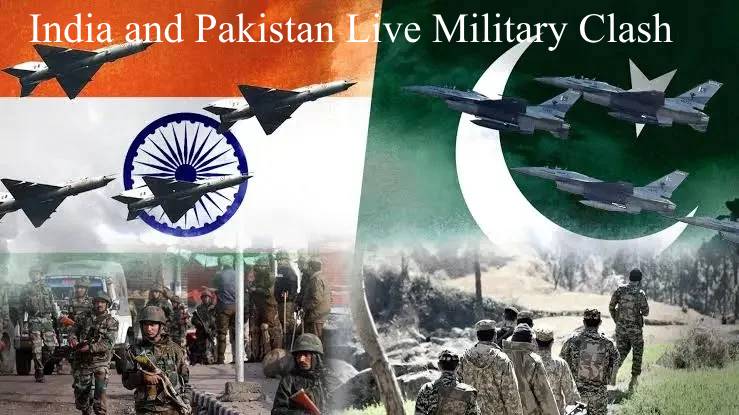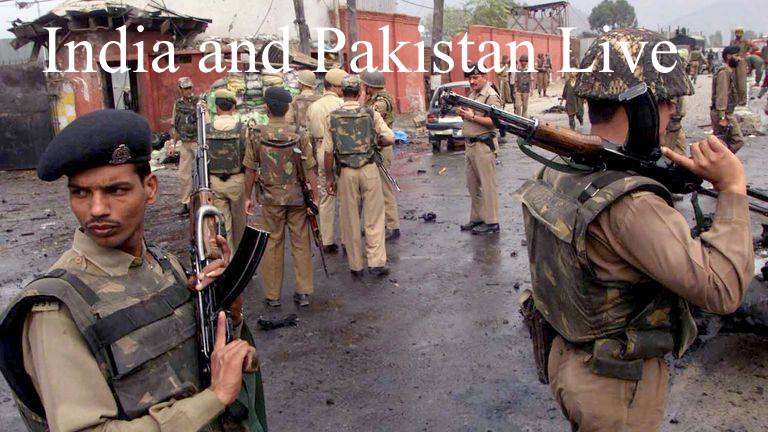Tensions between India and Pakistan have surged to alarming levels this week, following a series of cross-border military strikes, missile attacks, and retaliatory shelling that have already left at least 48 people dead. As the two nuclear-armed neighbors exchange fire, regional stability hangs in the balance with growing concerns from the international community.
The latest escalation began on Wednesday, May 7, when India launched a coordinated missile assault targeting what it called “terrorist training camps” in Pakistan and Pakistan-administered Kashmir. In response, Pakistan’s military confirmed that Indian missiles struck three airbases within its territory. Although Pakistani forces claimed to have intercepted several incoming missiles, the offensive has resulted in significant infrastructure damage and mounting casualties.
Table of Contents
Civilians Among the Dead as Artillery Shelling Intensifies
According to Pakistan’s Inter-Services Public Relations (ISPR), the military’s media wing, Indian drones also penetrated Pakistani airspace on Thursday, May 8, killing at least two civilians in targeted strikes. In total, 32 fatalities have been reported on the Pakistani side, including several non-combatants, while 16 individuals have died in Indian-administered Kashmir and nearby areas.
Blasts were heard across Indian-administered Kashmir and the city of Amritsar in Punjab state, where India’s armed forces were reportedly engaging and shooting down surveillance and attack drones. Meanwhile, heavy artillery fire resumed along the Line of Control (LoC), the de facto border that divides Kashmir between the two nations.
Pakistan’s Firm Stance: “No De-escalation” India and Pakistan
In a press briefing on Friday, Pakistan’s military spokesperson reaffirmed Islamabad’s position, stating that there will be “no de-escalation” until a full military and diplomatic response has been made to what Pakistan describes as “unprovoked aggression” from New Delhi.
Pakistan’s Information Minister echoed this message, clarifying that the country has only responded in self-defense so far and seeks to avoid further civilian harm. “We have only defended our sovereignty. India has crossed a red line,” the minister said, calling on global powers to intervene diplomatically to prevent the situation from spiraling into full-scale war.
Origin of the Conflict: India and Pakistan
The present crisis traces back to April 22, when a deadly attack occurred in Pahalgam, a scenic town in Indian-administered Kashmir. The assault, which killed at least nine Indian security personnel and wounded several others, was swiftly blamed by India on Pakistan-based militant groups. India alleged that the attackers were trained and supported across the border, although Islamabad has denied all involvement, calling the accusations “baseless and politically motivated.”
Following the attack, nationalist rhetoric surged in India, particularly from the ruling party, which has faced criticism over national security lapses. Military operations were quickly mobilized, leading to the current phase of open hostilities.

India Defends Its Position
India’s Ministry of External Affairs issued a formal statement asserting that Wednesday’s missile strikes were “precision operations targeting terrorist infrastructure.” The statement emphasized that the strikes were conducted with the objective of “eliminating clear threats to national security,” adding that “any civilian casualties, if confirmed, are deeply regretted.”
Indian military officials also stated that all offensive maneuvers have been conducted within “predefined operational parameters” and that retaliatory threats from Pakistan would be met with appropriate force.
International Response: Calls for Restraint
The international community has responded with growing alarm. The United Nations Secretary-General urged both India and Pakistan to “exercise maximum restraint” and open dialogue to de-escalate the situation. Similarly, the United States, China, and the European Union have issued statements expressing concern about the potential for the conflict to evolve into a broader war, given the nuclear capabilities of both nations.
China, a long-standing ally of Pakistan and a regional power with stakes in the region through the China-Pakistan Economic Corridor (CPEC), has called for an emergency meeting of the UN Security Council, while also offering to mediate a diplomatic resolution.
Historical Tensions and the Kashmir Dispute:India and Pakistan
India and Pakistan have fought three full-scale wars since gaining independence from British rule in 1947, two of which centered on Kashmir, a territory both countries claim in full but control in part. The region has remained a flashpoint for decades, with frequent skirmishes along the LoC and recurring insurgencies, often leading to deadly confrontations like the current one.
This latest clash adds to a long list of military escalations, including the 2019 Balakot airstrikes, when Indian warplanes bombed a site in Pakistan’s Khyber Pakhtunkhwa province following a deadly terror attack on Indian forces in Pulwama. That incident also triggered retaliatory air raids and a dogfight between India and Pakistan fighter jets.

Humanitarian Concerns on the Rise
With both sides locked in a tit-for-tat military strategy, humanitarian agencies have raised alarms over the growing toll on civilians. Several villages along the LoC have been evacuated, and local media reports suggest that thousands have been displaced on both sides of the border.
Hospitals in Pakistani Punjab and the Kashmir valley are operating under emergency conditions, while Indian security forces have imposed curfews and communication blackouts in high-risk areas.
Future Outlook: Is Diplomatic Dialogue Possible?
Despite calls for peace, both governments have thus far shown no willingness to back down. Pakistan maintains that it will continue to retaliate unless India halts its attacks and agrees to international mediation. India, on the other hand, insists on its right to conduct preemptive strikes against perceived terror threats and demands Pakistan take concrete action against militant groups operating within its borders.
Analysts warn that if neither side de-escalates soon, the region could witness a prolonged conflict with devastating consequences for South Asia and beyond.




